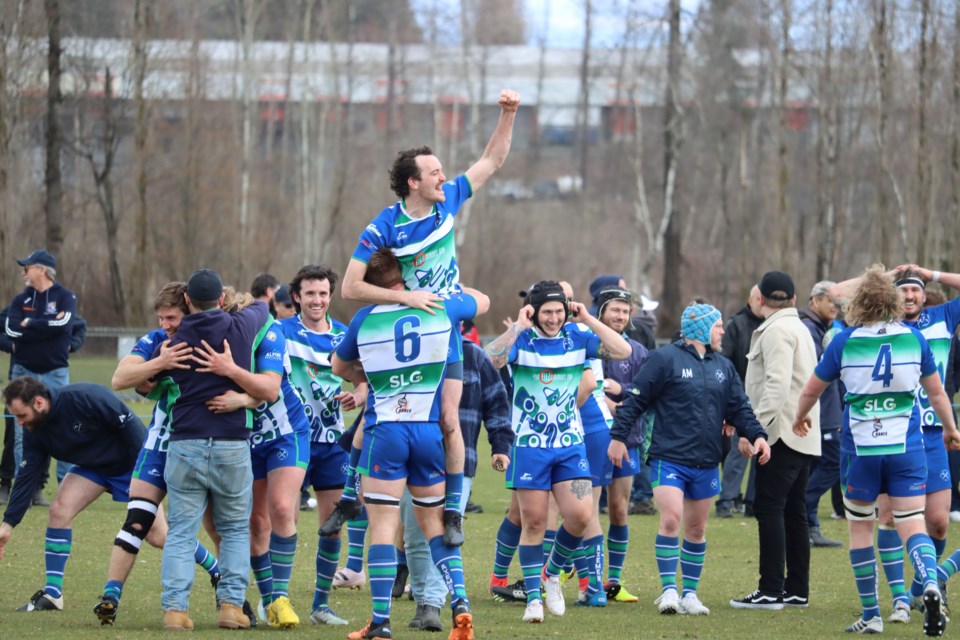Late American billionaire and presidential candidate Ross Perot once said: “Life is never more fun than when you’re the underdog competing against the giants.”
Members of the Axemen Rugby Club chose to live by that maxim when they transferred into BC Rugby’s Division 1 last fall. It wasn’t a shift they necessarily needed to make—the Squamish-based team had just won a Division 2 title months earlier—and few would have blamed them for staying put. After all, the Axemen have only been around since 2014, and are still a relatively nascent organization.
Instead, head coach Stephen List and his squad made a bold leap into the fray against decades-old clubs with more established talent pipelines.
It was certainly no walk on the beach. The Axemen opened their inaugural Division 1 campaign with a 3-6 record and endured a three-game losing streak in January and February, just as playoffs were approaching. It would have been easy at that point to write the season off, to form cliques, or to no-show at training sessions.
But the Axemen are made of sterner stuff.
“From my perspective, there were glimpses in those games [we lost] of some really good rugby,” said List. “We were annoyed with those results, but we just kept plugging away.”
Newcomers and experienced players alike remained focused through long road trips and harsh winter weather. Fuelled by lively local fans, the club ripped off three home wins in March over Surrey, Nanaimo and Trinity Western University to enter the postseason as a No. 8 seed.
Slaying a giant
Then came the Axemen’s first-ever Division 1 playoff victory.
Most observers had written them off. Their opponent, Burnaby Lake, was a highly-seeded Premier Reserve club playing at home with nearly 30 years of history and an undefeated regular season behind them. The unit from the Sea to Sky didn’t blink. In fact, veteran inside centre and assistant coach Blake Mahovic felt that his team’s underdog status gave them “complete control over the narrative of that day.”
And what did the Axemen want the narrative to be?
“We wanted to go out and play as hard as we could for each other,” Mahovic explained.
Within five minutes of taking the field, the Axemen’s enthusiasm turned into confidence. They fought Burnaby Lake to a standstill, their collective self-belief growing with each tackle and turnover. The dark horses even pulled ahead in the second half, before facing a relentless assault from the Blue and White.
Axemen players laboured on defence to the point of exhaustion. Burnaby Lake pushed to within 10 metres of their goal line, possessing the ball for much of the game’s final 15 minutes. Yet the only number that ended up mattering was the score: 24-21 in favour of the visitors.
List is beyond proud of his team for putting the “dog” back in “underdog.”
“We showed a lot of fight,” he said. “You train for skills, you train for tactics, but you can’t really train for just sticking in there and working hard for each other, and that ultimately was what that whole game was about.”
The Cinderella story would ultimately end on April 15 with a close 26-21 defeat to the Nanaimo Hornets. Even so, the Axemen have more than proved their mettle.
Collaboration over competition
One might expect List and Mahovic to name the Burnaby Lake breakthrough as a clear highlight for their season. They don’t.
“The Division 1 playoff game, to me, wasn’t the big success of the year,” said Mahovic, who also serves as his team’s Director of Rugby. “The big success of the year was the amount of guys that we had out [playing]. We’ve had record numbers … and what really makes me smile is [during our last regular season games] when we had close to 50 guys representing the Axemen in a single day.”
Unlike many high-level squads, the Axemen have maintained a community-centric model of player development. Inexperienced or recreational athletes at the Division 3 level train alongside Division 1-calibre talent all the time. The club’s focus is not on championships, but rather on growing the game and serving local communities.
Mahovic describes the Axemen’s approach as “collaboration over competition.” He, List and the rest of their peers have been diligent in introducing rugby to schools in Whistler, Pemberton and Squamish, including a tag-pulling variant for youths who are shy of physical contact. They want their sport to always be accessible, regardless of how each season’s win-loss column turns out.
“This season gives us the confidence to know that we can continue to be a community-first club and perform at the [Division 1] level without giving up any of those core values that I think some teams do give up on,” said Mahovic. “We’re showing that building a strong community is just as valuable as creating a competitive environment.”
Nowadays, a new obstacle looms: the closure of Quest University.
For years, the Axemen have trained on-campus at Quest, at one point coaching the institution’s rugby program. Mahovic has struggled to find suitable alternatives in Squamish, in part because local decision-makers are used to viewing different levels of sport (i.e. adult soccer versus youth soccer) as separate entities rather than one united body like the Axemen.
With Quest University’s future in limbo, club leaders are in “a genuine panic” trying to figure out what’s next. Yet their mission remains the same: further the local growth of rugby and become more involved with community programs in and outside of sport. The Axemen are composed largely of expatriates from rugby-loving nations, and while that is positive, List and Mahovic also hope to see new waves of Sea to Sky players join their ranks in future years.




